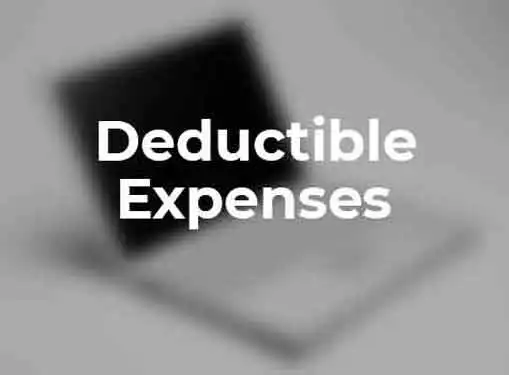Tax Tips for Entrepreneurs
Deductible Business Expenses
If you own a business, you can claim deductions for your business expenses and pay less in taxes. We've got the scoop on what business expenses are deductible.
Federal and state governments generally collect taxes on net profits as opposed to gross receipts.

For small businesses, effective tax management means maximizing your deductible business expenses to decrease the amount of taxable income.
But the issue of deductible business expenses isn't as cut and dry as it seems. Some typical business expenses may not be fully deductible while others require special handling or a multi-year deduction strategy. Since a single misapplication of deductible business expenses can trigger an IRS audit, it's worth educating yourself about the deductibility issues surrounding common small business expenses.
- Fully deductible. The IRS definition of deductible business expenses says that they must be both ordinary and necessary. In other words, they must be expenses that are common in the industry and must be helpful (but not necessarily indispensable) to your operation. As a rule, if an expense meets these criteria, it will be fully or partially deductible.
- Non-deductible or partially-deductible. Certain expenses like political contributions, penalties, fines and social memberships usually aren't deductible business expenses. Other expenses including gifts, meals, entertainment, home office, and auto expenses may be deductible, but the amount of the deduction is limited by IRS guidelines.
- Personal vs. business expenses. Some business expenses are subject to an allocation that distinguishes between personal and business use. The personal use of business assets or expenses is not deductible for tax purposes, but the business use of personal assets may be deductible. The IRS uses the example of a loan that is used for 70% business and 30% personal purposes. For tax purposes, 70% of the interest paid on the loan will be deductible on your business tax return.
- Capital expenses. Depending on the situation, the deductibility of capital or equipment purchases usually receives special tax treatment. Small capital purchases can often be fully deducted as a normal business expense. Section 179 also allows for some larger capital purchases to be fully deducted in a single tax year. However, significant capital expenses are usually deducted according to a multiyear depreciation schedule.
- Cost of goods sold. Expenses related to the purchase of wholesale products for resale are deductible. But there are two issues you need to be concerned about when deducting the cost of goods sold, i.e. the amount of the deduction and how you will deduct expenses related to the purchase and/or storage of goods for resale. Special IRS rules apply, so you'll need to conduct further research before you automatically deduct the full cost of resale goods in the current tax year.
Share this article
Additional Resources for Entrepreneurs


Conversation Board
We greatly appreciate any advice you can provide on this topic. Please contribute your insights on this topic so others can benefit.